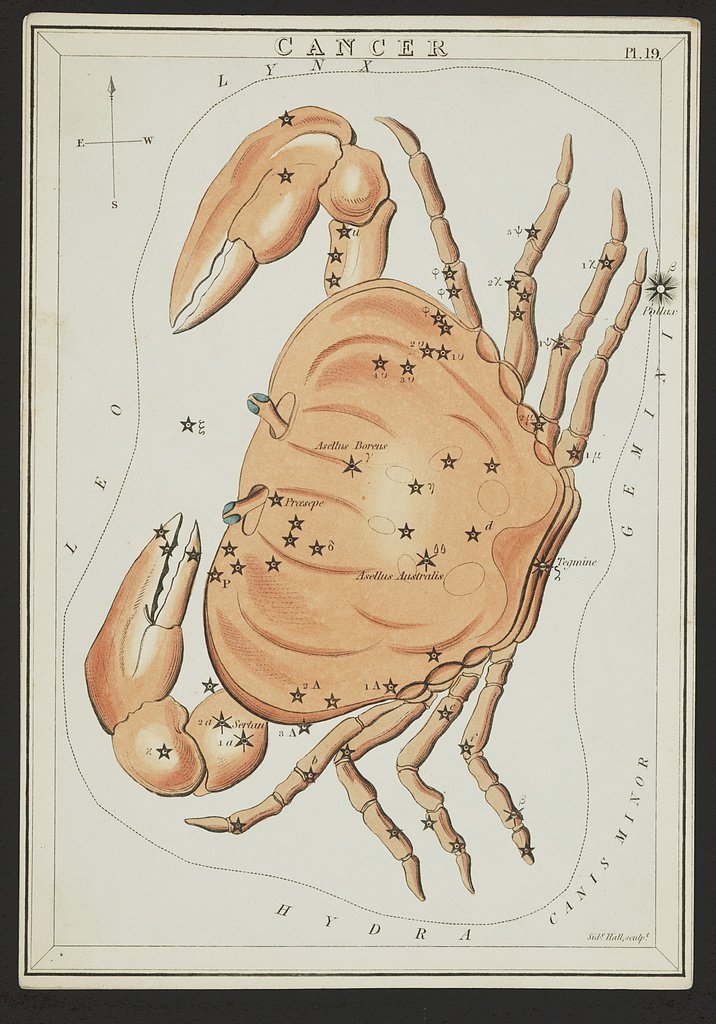2 August 2023
Cancer, meaning both the disease and the astronomical constellation, and canker, an ulcerous sore, have the same etymology. Both come into English from the Latin cancer (the constellation or the disease), and that in turn comes from the ancient Greek καρκίνος (karkinos), which carries the same meanings. While all the senses of the two words were present in Old English, their later use was heavily influenced and reinforced by the Anglo-Norman cancre.
Both the Latin and Greek words literally meant crab, and both the disease and the constellation were so called because they were crab-like in appearance, with the disease often presenting as a carcinomatous and ulcerative sore with a central core from which extend swollen veins that resemble a crab’s legs. Ancient and medieval sources did not differentiate the disease that we today call cancer from non-malignant sores and gangrene.
In Old English, cancer is used to refer to both malignant and non-malignant sores. The pronunciation is uncertain, with the second <c> most likely pronounced with a /k/, as in canker, but possibly in some instances with an /s/ as in the present-day cancer. Here is an example from a pre-Conquest medical text written c. 950:
Wiþ cancer aðle þæt is bite, sure, sealt, ribbe, æg, sot, gebærnd lam, hwætes smedma, meng wið æʒru, medowyrt, æferþe, acrind, apuldorrind, slahþornrinde, ʒif se bite weaxe on men, ʒewire niwne cealre & leʒe on, clæsna þa wunde mid.
(Against the sickness canker/cancer, that is ulcerous sores, sorrel, salt, ribwort, egg, soot, burnt loam, fine flour of wheat; mix with eggs, meadowsweet, æferth, oak bark, apple-tree barl, sloe bark; if the sore grows on a man, work up new calwer & lay on; cleanse the wound therewith.)
Æferþe is a plant name that appears multiple times in the work, but the plant it corresponds to has not been identified. Cealre or calwer usually refers to a substance made out of sour milk, either cheese, yogurt, curds, or something akin to those; here it is not clear whether this second poultice is a new concoction made from dairy or if cealre is being used generically to mean poultice and refers to a second application of the botanical one.
The name of the constellation also appears in Old English, although in some instances it takes Latin case endings, indicating that the name was not fully assimilated into English. Here is an example from Ælfric of Eynsham’s De temporibus anni, written c. 998:
Þonne se dæg langað þonne gæð seo sunne norðweard oð þæt heo becymð to ðam tacne þe is gehaten cancer.
(When the day lengthens, then the sun goes northward until it comes to the sign that is called cancer.)
We also see the constellation name in Chaucer’s Canterbury Tales, c. 1387. Here is an example from The Merchant’s Tale in a passage that describes the wedding of the characters January and May:
The moone, that at noon was thilke day
That Januarie hath wedded fresshe May
In two of Tawr, was into Cancre glyden;
So longe hath Mayus in hir chambre abyden,
As custume is unto thise nobles alle.(The moon, that was at noon that same day
That January has wedded fresh May
In two [degrees] of Taurus, was into Cancer glided;
So long has May in her chamber abided,
As it custom is to these nobles all.)
Sources:
Ælfric. De temporibus anni. Heinrich Henel, ed. Early English Text Society, O.S. 213. London: Oxford UP, 1942, 4.44, 36. Cambridge, University Library, MS Gg. 3.28, fol. 258r.
Anglo-Norman Dictionary, 2007, s.v. cancre, n.
Chaucer, Geoffrey. “The Merchant’s Tale.” The Canterbury Tales, lines 1885–89. Harvard’s Geoffrey Chaucer Website.
Dictionary of Old English: A to I, 2018, s.v. cancer, n.
Leonhardi, Günther. Kleinere Angelsächsische Denkmäler I. Bibliothek Angelsächsischen Prosa. Hamburg: Henri Grand, 1905, 33. Archive.org. London, British Library Royal MS 12 D.xvii.
Middle English Dictionary, 2019, s.v. canker, n.(1), Canker, n.(2)
Oxford English Dictionary, third edition, June 2008, s.v. cancer, n. and adj., canker, n.
Image credit: Sidney Hall, 1825. Library of Congress. Public domain image.

